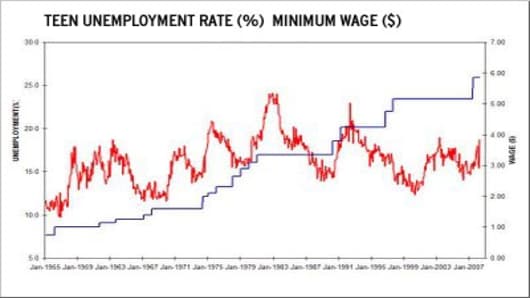Last year the United States Congress overwhelmingly passed the Fair Minimum Wage Act of (you guessed it) 2007, which would phase in a change in our national price floor from $5.15 per hour to $7.25 per hour.
Free market economics predicts that wage floors cause unemployment especially among young people and minorities who are more likely to fall at the bottom end of the wage scale. That’s because the demand curve slopes downward: if something costs more, you buy less of it. That goes for widgets, Wii’s, and labor hours.
On Friday, we again received confirmation that the laws of supply and demand really are, well, laws. The unemployment rate spiked from 5% to 5 ½% in one month, and the increases in teen and minority joblessness was overwhelmingly larger than for other categories. It’s happening now because now is the time they’ve started looking for work. It doesn’t matter when the law passes, or even principally when it kicks in. It’s when a lot of people start looking for work at the same time, say, when school starts letting out, that we see that a lot of kids have been priced out of a summer job. They might be a good deal for employers at five an hour, but a money-losing proposition at seven.
First, the good news. Politicians can’t unmake universal laws of science by decree, great news for anybody who depends on gravity or e=mc2. Also, this is not the stuff of recession. When we have a huge spike in lay-offs of software engineers or business managers or physicians, we’ll now we’re in trouble. Folks like that are big potatoes, GDP-wise. Lifeguards are not.



